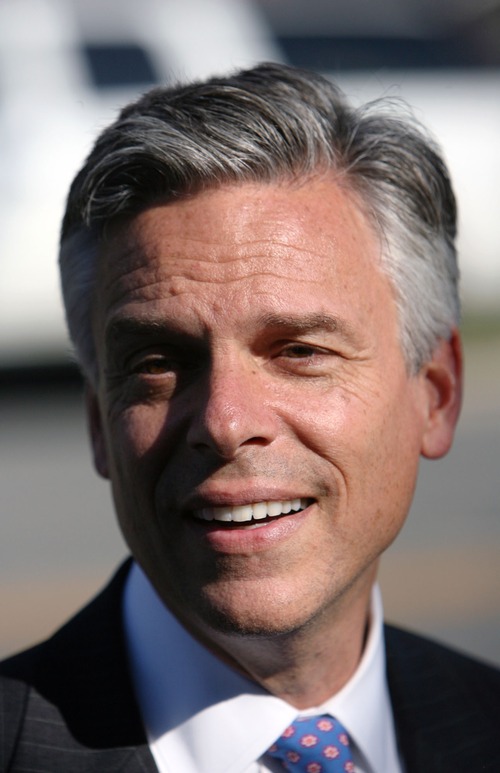This is an archived article that was published on sltrib.com in 2013, and information in the article may be outdated. It is provided only for personal research purposes and may not be reprinted.
Much ink has been spilled over what's wrong with Washington.
The rise of partisan media, too much money in politics and congressional gerrymandering that rewards ideologues with safe seats have all been offered as diagnoses for government dysfunction.
These explanations are accurate — but almost totally irrelevant to the urgent challenges at hand.
The American people can't just hope for the creation of a better "system." Reducing money in politics and building a better election system are worthy and important endeavors — but they are tough, multi-year, state-by state slogs.
We need to attempt those things and to seek solutions now from the system and the leaders we already have. Businesses are not hiring, and investors are not investing as a direct result of the uncertainty created by Washington. Too many would-be workers are not working. The coming generations are being doomed to a worse standard of living than previous generations.
Knowing that should light a fire under everybody in Washington. But it hasn't. The gridlock continues, most recently with the "fiscal cliff" fiasco, and the fight over the debt ceiling looms.
From our perspective, there is only one way for leaders in Washington to step up: They need an attitude adjustment. Everyone needs to be willing to sit down with anyone — conservative, liberal or anyone in between — to work together to achieve success for our nation. Everyone needs to recognize that principled and deeply held political beliefs don't require an all-or-nothing approach to governance and that the letter behind a person's name does not automatically make them stupid or treasonous.
To be clear, we are not naive about the challenge of fostering cooperation across the aisle. There are philosophical differences between Democrats and Republicans that can't be papered over with nice words about civility.
But adopting an attitude focused on problem solving is a deeply pragmatic response to Washington's dysfunction. With Democrats controlling the Senate and Republicans controlling the House, no one can get everything they want. We will either work across the aisle to fix problems or we will achieve nothing.
Luckily, we are not the only ones who recognize this. On Monday morning, the group No Labels — a collection of Democrats, Republicans and independents dedicated to promoting a new politics of problem solving — will unveil two dozen "problem solvers": a group of House and Senate members evenly split between Republicans and Democrats who have agreed to hold monthly meetings in 2013 to build trust across the aisle.
These forward-looking Americans include: Sens. Mark Begich, D-Alaska, and Dean Heller, R-Nev., and Reps. John Barrow, D-Ga., Sanford Bishop, D-Ga., David Cicilline, D-R.I., Jim Cooper, D-Tenn., Charlie Dent, R-Pa., Scott DesJarlais, R-Tenn., Mike Fitzpatrick, R-Pa., Michael Grimm, R-N.Y., Janice Hahn, D-Calif., Richard Hanna, R-N.Y., Jim Himes, D-Conn., Lynn Jenkins, R-Kan., Jack Kingston, R-Ga., Adam Kinzinger, R-Ill., Dan Lipinski, D-Ill., Dave Loebsack, D-Iowa, Jim Moran, D-Va., Reid Ribble, R-Wis., Scott Rigell, R-Va., Kurt Schrader, D-Ore., and Peter Welch, D-Vt.
This is a big deal. While in past years members of Congress used to interact regularly with members of the opposite party, today members of Congress interact very little with people from the other party — or even members of their own party in the opposite body. Members' daily lives are dominated by party caucus, policy and fundraising meetings that are focused on winning elections or destroying the opposing party. There isn't much time left over to actually govern.
But the problem solvers can and will seek to change this. In the next year, No Labels' grass-roots supporters will strive to expand the number of problem solvers, with a goal of recruiting 75 members by year's end. This could transform how Washington works. And it won't be long before members start hearing demands from their constituents to join the group. Millions of Americans who have tired of the hyper-partisanship have realized that there is an organized group that can finally give them a voice in our political system. They have gone to NoLabels.org and are telling their friends and neighbors to as well.
Despite the gloomy outlook in Washington, the United States has great potential and promise. The American people need their leaders in Washington to start supporting our economy and stop subtracting from it. We can begin tapping our potential the moment we stop taking score and begin taking steps to start solving problems. That's the only realistic way forward for America.
Joe Manchin, a Democrat, is a U.S. senator from West Virginia and one of the two dozen problem solvers. Jon Huntsman, a former governor of Utah, was a Republican candidate for president last year. They are the national leaders of No Labels (http://www.nolabels.org). This column first appeared in The Washington Post.



